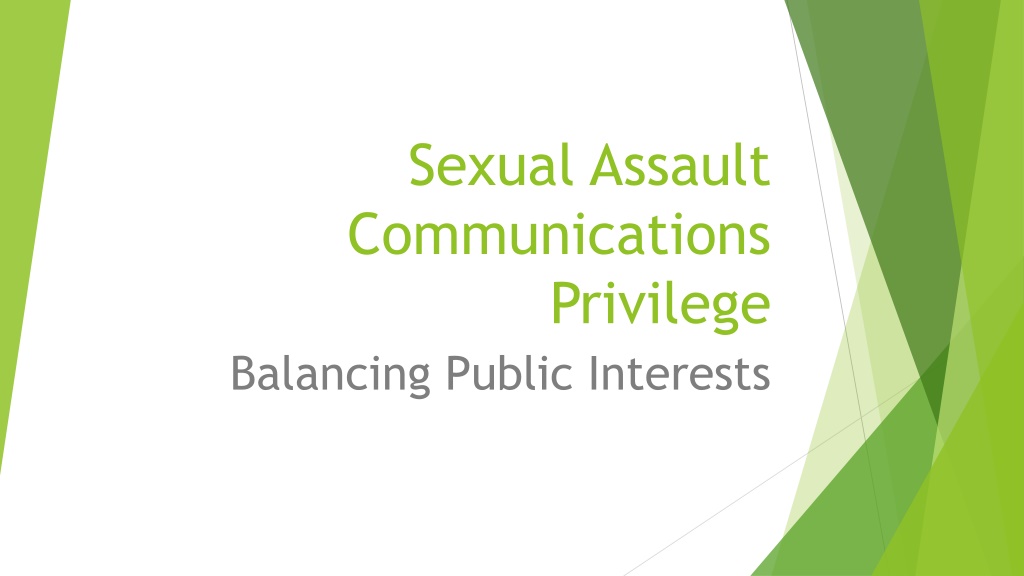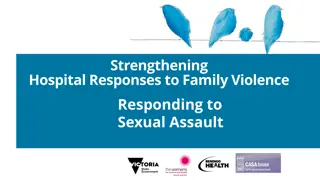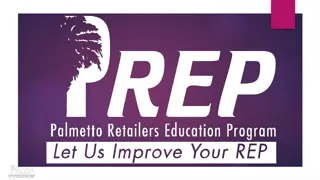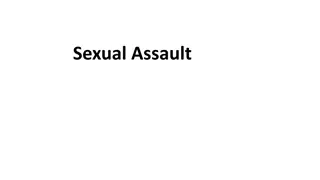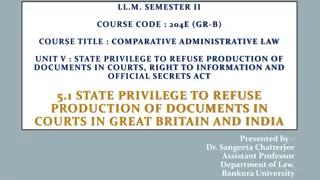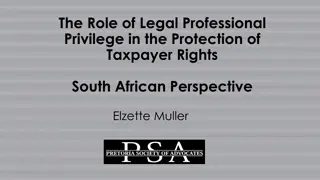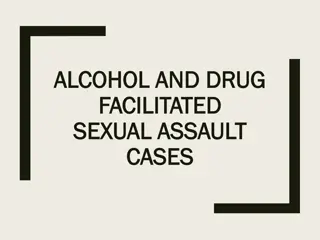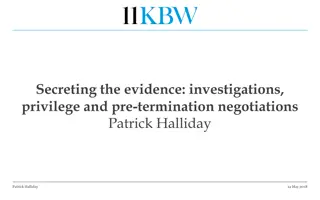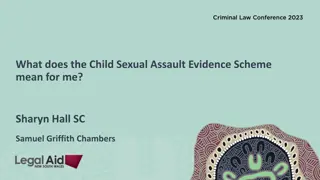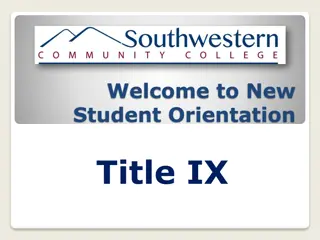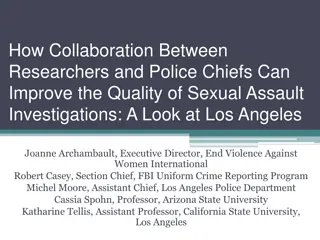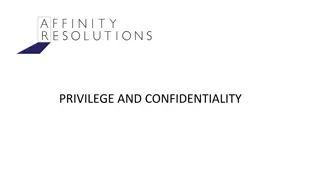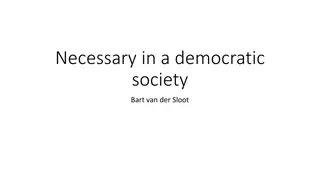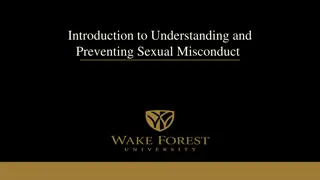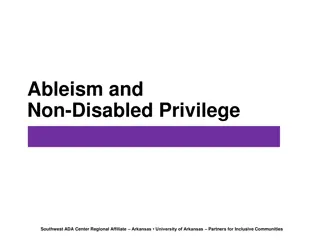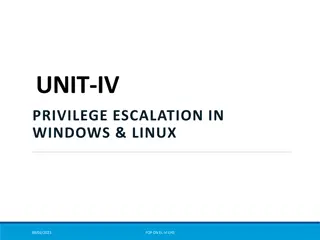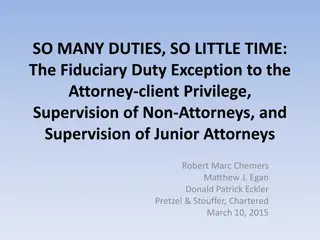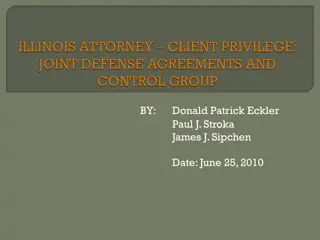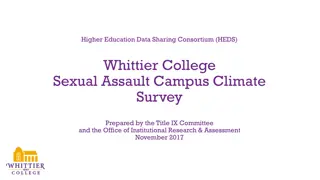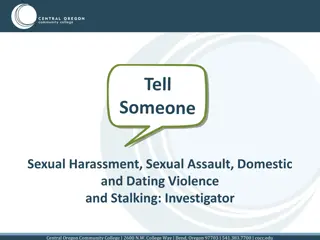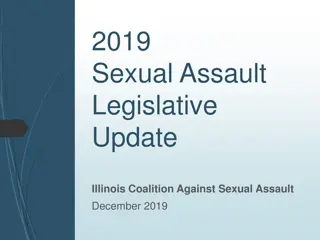Understanding Sexual Assault Communications Privilege and Balancing Public Interests
Exploring the complexities and practical challenges surrounding Sexual Assault Communications Privilege (SACP), this content delves into the reasons for its establishment, the services it provides, and the implications for both defence lawyers and complainants in sexual assault trials. It sheds light on the role of counsellors, the process of issuing subpoenas for sensitive records, and the importance of understanding the nuances of counselling communications in legal proceedings.
Download Presentation

Please find below an Image/Link to download the presentation.
The content on the website is provided AS IS for your information and personal use only. It may not be sold, licensed, or shared on other websites without obtaining consent from the author. Download presentation by click this link. If you encounter any issues during the download, it is possible that the publisher has removed the file from their server.
E N D
Presentation Transcript
Sexual Assault Communications Privilege Balancing Public Interests
Outline 1. Why do we have a SACP? The SACP under siege. The SACP Service 2. Practical challenges for defence lawyers 3. How is the SACP working a complainant s perspective 4. Interaction with duty of disclosure
Why do we have a SACP? Law reform in the 70s and 80s A counsellor is locked up 1997 a new privilege 2010 funding for victims
The SACP Service Three inhouse solicitors A list of private practitioners who are on the Indictable Crime Solicitor Panel 190 referrals this year
SEXUAL ASSAULT COMMUNICATION PRIVILEGE Practical challenges for defence Lawyers issuing subpoenas in Sexual Assault Trials 2024
ISSUING A SUBPOENA FOR COUNSELLING/MEDICAL/PSYCH RECORDS IN SEXUAL ASSAULT TRIALS You don t know what s in it, you suspect that it s juicy.. The material is a smoking gun. You think it will be enough to discredit the complainant The documents will prove they are lying or have a motive to lie It will prove they were not taking their meds It will prove they consented The documents will challenge the credibility & reliability of the complainant
COUNSELLING COMMUNICATIONS NO DEFINITIVE LIST: S296 (4) Counsels if the person has Training study or experience relevant to the process of counselling someone who has suffered HARM S295. Counsellor (including school counsellor) Psychiatrist Psychologist Social Worker Mental health nurse 1800 RESPECT Lifeline FACS
KNOW YOUR BRIEF Issuing subpoenas (Must be more than LFP) / MUST have SPV EXAMPLES of SUBSTANTIAL PROBATIVE VALUE Inconsistent statements Where the complainant suffers from a medical or psychiatric condition which may affect the reliability of their evidence (a connection between a diagnosis where symptoms are likely to affect credibility capacity to rationally recall the SA / current hallucinations/delusions may not be enough). Refusing to take medications. Where the evidence may bear upon a particular issue at trial Where the allegation arose after a EMDR/hypnotherapy session (R v Tillott) CCA 1995, R v KG 2001 NSWCCA Where a Sexual Assault counsellor has provided a statement to the police and is to be called as a Crown Witness a) b) c) d) e)
PREPARATION IN THE FORM OF A NOM & DETAILED SUPPORTING AFFIDAVIT is key When seeking leave to issue specify precisely what orders you are seeking. The Judge will base their decision from what s contained in the supporting affidavit NOTICE OF MOTION / ORDERS SOUGHT: Pursuant to S298(1) CPA 1986 leave be granted to issue a subpoena on . 1. Pursuant to S299B(4) CPA 1986 For documents to be delivered to the Court and first access granted to the protected confider, returnable 2. Pursuant to S298(3) CPA 1986 leave be granted to admit into evidence, the material produced under the subpoena to produce referred to in order 1. 3.
AFFIDAVIT (WHAT IT SHOULD CONTAIN) Address S299D factors HERE S299D(1)(a): Substantial probative value & s299D(1)(b): Documents not available elsewhere & s299D(1)(c), the Why the public interest in compelling or admitting the evidence substantially outweighs public interest in maintaining the confidentiality of the protected confidence and protecting the principal protected confider from harm (being harm resulting from the disclosure of the protected confidences: s299D(1)(c), s299D(2). Start with a chronology of events 1. List the discrepancies in the evidence/ Prior inconsistent statements 2. Anything that may challenge the credibility of the complainant 3. List what you expect to find & why 4. Indicate with specificity WHY you expect this material will assist in the defence of the accused 5.
WHAT IS NOT SUBSTANTIALLY PROBATIVE Anything that is NOT RELEVANT Name of the psychologist/ counsellor (Prohibited 298A CPA) Mandatory reporters /doubling as child counsellors s29 of the Children and Young Persons (Care and Protection) Act absolute bar. Material subject to exclusion in the Victims Rights and Support Act 2013, s113. Commonly, reports from victims support counsellors. Lack of complaint of sexual assault to a therapist/Counsellor (s294) Documents which are too remote in time / or too remote in content Documents relating to the sexual experience or health of a complainant (S294CB) Suicide attempts Counselling notes from earlier admissions
CASELAW KS & Veitch (No 2) [2012] NSWCCA 266 Key case - Extensive discussion and analysis of provisions NAR v PPC1 [2013] NSWCCA 25 Relevance of consent initially made to the police & the necessity of inspection of documents to determine leave. Also authority for counsellor to be performing counselling role qualifications PPC v Williams [2013] NSWCCA 286 Global approach incorrect / admissibility ER v Khan [2015] NSWCCA 230 Definition of counselling qualifications not sufficient, (FACS) Onus on person asserting privilege necessary but not sufficient.
CASELAW CONTinued Rohan v R [2018] NSWCCA 89 Provides a detailed analysis of S299B4 enabling the Court to order production of documents on itself. Where complaint not disclosed to a counsellor S294 direction. PPC v Stylianou [2018] NSWCCA 300 Production is to the Court S299B4 to facilitate consideration of docs. Courts MUST INSPECT docs and engage with S299D R v Bonanno, ex parte protected confider [2020] NSWCCA 156 Reaffirms purpose of legislation. Duty on practitioners to understand and assist Court in the application of the legislation.
Does the privilege work for complainants? Doesn t meet community expectations Doesn t achieve policy objectives Does protect privacy to some extent
SACP and mental health First disclosure Mental health if associated with dishonesty, memory issues, psychotic or delusional behaviour (Pickering J, 2021, unpublished judgment)
HH Judge Pickering in R v Trad Anxiety and depression are some of the most common mental illnesses in our society. Numerous judges of the Supreme Court, District Court and Local Court suffer it. It is renowned in barristers. Dentists suffer it, doctors it suffer it, pilots suffer it. Pretty much every profession, especially this profession, suffer it. No one would dare say a judge or a barrister is more unreliable, more untruthful, or more incapable of doing their job because they suffer anxiety and depression. There is no basis to say that a [teenage girl] is therefore more likely to be dishonest, have memory issues, be unreliable, have difficulty in recalling things or be psychotic or delusional because of some potential issues relating to depression or anxiety. That is based on a stereotype and a stigma that will hopefully be removed from society soon.
(continued) If there was material that showed that there was a potential that the complainant suffered a mental health issue that did in fact create issues with dishonesty, memory issues, psychotic or delusional behaviour, then fine, it would be appropriate to issue a subpoena.
Crown duty of disclosure Material obtained by Police is still privileged In Marwan, Crown not required to take steps to obtain inherently confidential information not presently known to it: Marwan v DPP [2019] NSWCCA 161
Disclosure and phone records R v Lam One matter advanced by [the defence] was that the Crown had failed in its duty of disclosure because the material sought should have been served by the Crown The material sought by each subpoena is not material that is in the possession of the Crown or police and there is no obligation of disclosure on the part of a witness. Questions about the scope and content of the Crown s duty of disclosure aside, an accused who contends that disclosure is inadequate is entitled to request that subpoena be issued to obtain material said to fall within the ambit of the duty . Unless set aside, such a subpoena will be enforceable.
